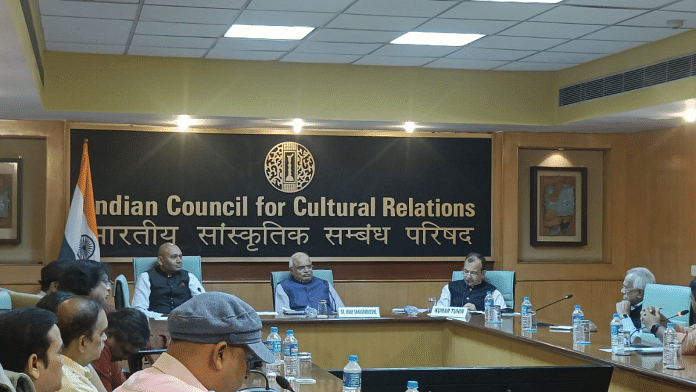New Delhi: The Indian Council of Cultural Research (ICCR) is organising the first-ever Vaishali Festival of Democracy — a one-day event to understand democratic workings of India ‘in its place of origin in Vaishali, Bihar’. The festival, which will be held on 15 September in Bihar’s Nalanda University, coincides with the International Democracy Day.
At a press conference in Delhi Wednesday, ICCR president Vinay Sahasrabuddhe stressed the importance of India being known as the ‘Mother of Democracy’ and said that the festival will highlight the various dimensions of India’s democracy and its historical roots, as well as facilitate dialogue on its journey through the years.
According to ICCR website, the Festival of Democracy is being organised after the exhibition, ‘India: Mother of Democracy’, organised by the Union Ministry of Culture at the Bharat Mandapam as part of the side events of the G20 summit.
“Traditionally, our historians perhaps did not give adequate importance to the fact that India is the mother of democracy. Initiatives like these seek to clear the historical backlogs and to shed light on those who aren’t aware,” the ICCR president added.
Sahasrabuddhe, who was joined by ICCR Director General Kumar Tuhin, gave an overview of the festival’s agenda and participants, which include eminent personalities from politics, academia, media, and civil society.
He said that the festival will be inaugurated by former president Ram Nath Kovind, along with Bihar Governor Rajendra Arlekar and Minister of State for External Affairs and Culture Meenakshi Lekhi.
He also mentioned that none of the election commissioners would be present at the event due to time constraints and that an invite had been sent to members of the Opposition in Bihar as well. The audience would comprise both foreign students and ambassadors.
The festival will feature two panel discussions on “the implementation of democracy” and “the tradition of democracy’” chaired by Assam Chief Minister Himanta Biswa Sarma and Jawaharlal Nehru University vice-chancellor Santishree Dhulipudi Pandit, respectively.
The festival will also see the launch of a book based on the experiences and perspectives of foreign visitors to India, who witnessed the diversity and vibrancy of Indian democracy.
Also Read: How do you count the takeaways from India’s G20? It’s as simple as ABCD
Bridging past and present
Sahasrabuddhe said that the festival aims to bridge the past and present, fostering discussions on democratic ideals, cultural exchange, and global understanding.
When asked why there is a need to institutionalise a basic concept like democracy, Sahasrabuddhe asserted that the Festival of Democracy holds significant historical and cultural importance, as it commemorates the birthplace of democracy and celebrates the enduring values of democratic governance.
“Often, when we are given something as a legacy, we tend to overlook its importance. Sometimes we forget. As a fundamental and integral part of our culture, we should constantly debate, discuss and celebrate it. That is our main aim,” he added.
Talking about the G20 summit in Delhi, Sahasrabuddhe said the summit increased India’s global stature and made the country “an experience in itself” — beyond travelogues or guidebooks.
“Democratic ideals, when seen in the larger context, are like a family with a balance of both collectivism and individualism. However, familiarity breeds contempt. To not let familiarity cloud our thinking, the importance of democracy needs to be told externally,” Sahasrabuddhe said. “To be democratic is also to be politically correct.”
Questioned if ICCR will rename itself amid the Bharat name change discussions, Sahasrabuddhe said, as a 72-year-old organisation, ICCR always stood by the Constitution, and the Constitution has both Bharat and India in it. “If the government issues any such order, our governing council will discuss and decide accordingly. It is a democratic institution,” he added.
Meanwhile, the plight of the Afghan students in India also found a mention at the press meeting after hundreds of Afghan students, whose visas have expired, reportedly staged a protest in Delhi Wednesday requesting their stay be extended to continue their education.
“No Afghan student has been forced to leave India without his will. Afghanistan remains a top priority for the government, especially the students. ICCR along with the MEA has been working very hard to address the situation of those students who are here and who have not been able to go back after completion of their studies,” said Kumar Tuhin.
“If it is possible, we will try to grant them scholarships for the next year. We have resolved many such concerns of the students and have provided numerous scholarships to undergraduate students,” the ICCR Director General added.
(Edited by Richa Mishra)



